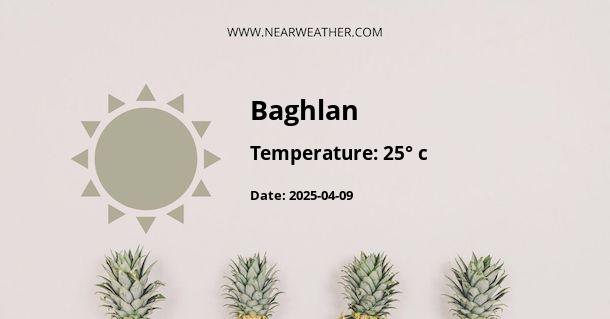Climate and Weather in Baghlan, Afghanistan
Baghlan is a province located in northern Afghanistan. It is known for its diverse landscape, ranging from fertile valleys to rugged mountains. The region experiences a continental climate, with hot summers and cold winters. Understanding the climate and weather patterns in Baghlan is essential for residents and visitors alike. In this article, we will explore the climate of Baghlan and provide detailed information about its weather year-round.
Temperature
The temperature in Baghlan varies significantly throughout the year. Summers are generally hot, with average temperatures ranging from 30°C (86°F) to 40°C (104°F) in the months of June, July, and August. The highest recorded temperature in Baghlan was 46°C (115°F) in July. Winters, on the other hand, are cold and often accompanied by snowfall. Average temperatures during winter months, including December, January, and February, range from 0°C (32°F) to 10°C (50°F). The lowest recorded temperature in Baghlan was -20°C (-4°F) in January.
Here is a table summarizing the average monthly temperatures in Baghlan:
| Month | Average Temperature (°C) |
|---|---|
| January | 1 |
| February | 3 |
| March | 9 |
| April | 16 |
| May | 22 |
| June | 27 |
| July | 30 |
| August | 29 |
| September | 24 |
| October | 17 |
| November | 10 |
| December | 4 |
Precipitation
Baghlan experiences a relatively dry climate, with most of its precipitation occurring during the winter and spring months. The average annual rainfall in Baghlan is around 400 millimeters (15.7 inches). The wettest months are March and April, with an average rainfall of 60-70 millimeters (2.4-2.8 inches) per month. Summers, on the other hand, are very dry, with little to no rainfall. The driest months are June, July, and August, with average rainfall below 10 millimeters (0.4 inches).
Here is a table summarizing the average monthly rainfall in Baghlan:
| Month | Average Rainfall (mm) |
|---|---|
| January | 30 |
| February | 30 |
| March | 60 |
| April | 70 |
| May | 30 |
| June | 5 |
| July | 2 |
| August | 2 |
| September | 5 |
| October | 15 |
| November | 15 |
| December | 25 |
Snowfall
As Baghlan experiences cold winters, it is not uncommon to witness snowfall in the region. Snowfall typically occurs from December to February, with January being the snowiest month. The average annual snowfall in Baghlan is around 20-30 centimeters (8-12 inches). The presence of snow can significantly impact transportation and daily activities in the province.
Wind
Baghlan, being a landlocked province, does not experience strong coastal winds. However, it is still subject to occasional gusts of wind, especially during the winter months. These winds can increase the feeling of coldness and make the weather conditions more challenging.
Climate Hazards
Baghlan, like many other regions in Afghanistan, is susceptible to natural hazards and climate-related risks. Flash floods and landslides can occur during periods of heavy rainfall, particularly in the spring. These events can cause significant damage to infrastructure and pose a threat to human lives. It is important for residents and visitors to stay informed about weather forecasts and take necessary precautions during such events.
In conclusion, Baghlan experiences a continental climate with hot summers and cold winters. Average temperatures range from 30°C (86°F) in summer to 0°C (32°F) in winter. The region receives most of its precipitation during the winter and spring months, with average annual rainfall of 400 millimeters (15.7 inches). Snowfall is common during winter, and the average annual snowfall is around 20-30 centimeters (8-12 inches). Understanding the climate and weather patterns in Baghlan is crucial for planning outdoor activities and ensuring the safety and well-being of residents and visitors.
A - Baghlan's Latitude is 36.130680 & Longitude is 68.708290.
A - Weather in Baghlan is 25° today.
A - Climate Conditions in Baghlan shows overcast clouds today.
A - Humidity in Baghlan is 50% today.
A - Wind speed in Baghlan is 15.66 km/h, flowing at 342° wind direction. today.
